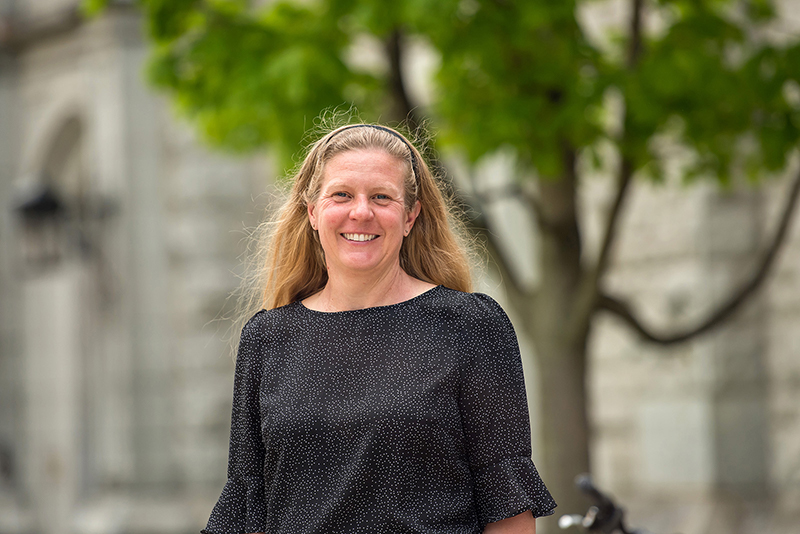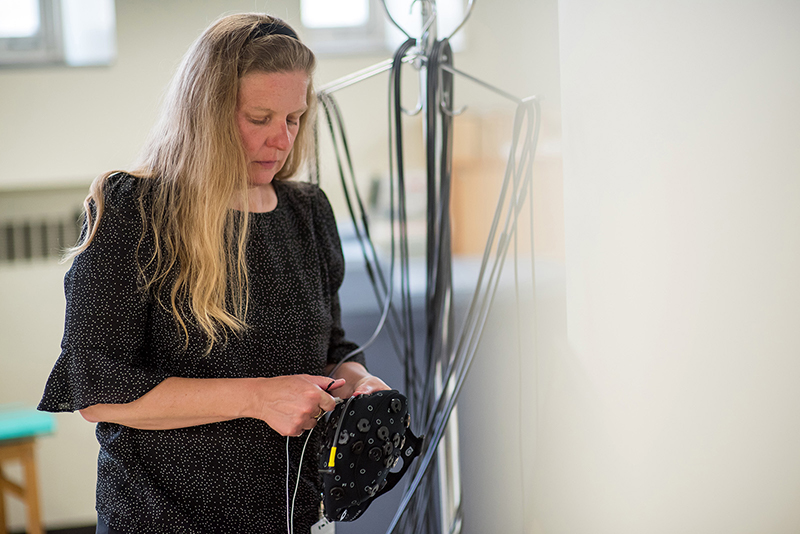Like a well-fitted prosthesis, Dr. Claire Davies has worked to seamlessly integrate her research in biomedical engineering with her practice as an educator. “Teaching informs research, and research informs teaching,” she said. That ethos is a big part of why Dr. Davies has become the 2020 recipient of the Chancellor A. Charles Baillie Teaching Award, a university-wide honour recognizing her teaching and its outstanding influence on the quality of student learning at Queen’s University.
An associate professor in Mechanical and Materials Engineering, Dr. Davies tries to push her students to consider applications beyond the classroom. “People with disabilities have trouble operating computers, so in my ergonomics class I ask my students, ‘what are the different tools that we can use? How fast or slow are they? How can we make them better?’” she said. To further encourage students to consider the real-world implementation of concepts, she incorporates the ground-breaking research being done by her own team at the Building and Designing Assistive Technology lab into her course material. “We want to make sure they experience what they’re being taught,” she said.

Dr. Davies admits that she wasn’t immediately in love with the craft of teaching. It took time, hard work, and some good advice before she became comfortable as an educator. She described being in front of a class during one of her early teaching experiences as a sessional instructor at the University of Guelph and feeling entirely out of her element. “I completely lost it,” she said. “The students were all over the place. I was in too deep.”
She sought the advice of Peter Wolf, an instructional course developer at Guelph who would later go on to work at Queen’s. He introduced her to the concept of project-based learning. “He taught me how you can include students in their own projects and learning process,” she said.
Now Dr. Davies' entire practice is centred around the idea of experiential learning. She recognizes that the best way to get students thinking about their impact beyond the classroom is to encourage them to get outside of it. That’s why she makes a concerted effort to get her students into the community, working directly with people who really need the assistive technologies they study in class.
She had a group of students this year design a playing-card holder for someone physically unable to hold up cards on her own. “I popped into the Zoom room right as the mother said to the students that this was the first time her daughter had ever been able to play cards by herself,” she said. “I can’t imagine what the students felt when they heard that response, because they knew they were making a difference in that person’s life right then and there.”
For the students in her lab, Dr. Davies is as much a mentor as she is a supervisor. For Davies, that means making herself available to provide any kind of support they may need. “I try to meet with my students every week so that they know they have someone to talk to, even if it isn’t related to the research directly,” she said. “I try to make sure that they know that they’ve got a supportive environment.”
Her efforts have clearly resonated with some: two of her students have received awards themselves for excellence in their teaching assistantships. “The mentorship role has been passed on to them,” she said.
Dr. Davies is adamant that the Baillie award is reflective of a team effort—from the teaching assistants who help her instill a passion for biomedical engineering among her students, to the people from her past who made her appreciate the value of mentorship.
As a master’s student at the University of Calgary, Dr. Davies was working under the supervision of Dr. Ron Zernicke, who would become dean of the School of Kinesiology in Calgary and then, and currently, at the University of Michigan. She emailed him one day to ask for a reference letter. He replied that he would have the document ready for her the following week. “I later found out that the day I emailed him, he was diagnosed with a brain tumor.” she said. “He filled out my application, submitted it, and then went in for surgery.”
Thankfully, Dr. Zernicke made a full recovery, and his commitment as her supervisor has left a lasting impact on Dr. Davies. “Knowing that he had that time for me, even in a situation where his health was failing, was exceptional,” she said. “He was the best mentor I could have had.”

Dr. Davies' dedication to her students has led her to form strong relationships with the young researchers in her lab that tend to last far beyond their graduation date. Her past students are now making important contributions at companies like Abbott Point of Care, Johnson & Johnson, Fisher & Paykel Healthcare and Holland Bloorview Kids Rehabilitation Hospital among others; despite their expertise, they still come back to her to seek advice.
“A few years after she graduated, one of my students was asked to make a decision she wasn’t comfortable with from a professional engineering point of view, so she asked me, ‘what do I do now?’” said Dr. Davies. According to her, that sort of thing is a common occurrence. “Students are always returning to ask questions, and figure out how they can move their employment or research further.”
One key piece of advice Dr. Davies has for people in the early stages of their academic career: teach to your strengths. “Try to make everything applied, because when you use the techniques and the knowledge that you have, then you can inform others effectively,” she said.